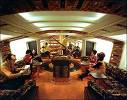Wednesday, November 15, 2006
Club Cube

I have spoken on this subject several times before on my blog, but here is yet another article about the, ahem, "office of the future". First of all, the article has enough perspective to touch upon recent disasters in workspace reform - namely the case of the advertising agency TBWA/Chiat/Day, whose CEO pioneered something called the "virtual office" back in 1993. News of this failure intrigued me, so I looked up the source article and have included a link to that one as well.
Apparently, the ad agency's employees were equipped with "portable phones and PowerBooks" and turned loose on the streets. The physical office itself was, in some sense, dismantled and its erstwhile cubicle rats had little choice but to jump ship to telecommuting. That was definitely encouraged. Unfortunately, we cubicle rats are creatures of habit and many of us structure our lives by coming into work. What remained at TBWA/Chiat/Day was very much lacking in the traditional office space amenities. Walls had been knocked down and cubicles had been pulled out. Employees were informed that, although they might continue to have "private space" (presumably meaning the space between one's ears), they would be afforded no "personal space". The office area was decked out with a random assortment of chairs, couches, table tops, even life-size toys - and everything everywhere was wired. Employees were invited to sit down any old place, plug themselves in, and start "creating". The problem was that no one was allowed to monopolize any of these ersatz work stations for more than a day. That interfered with the M.O. of the classic cubicle rat who, despite his or her intrinsic meekness in other respects, has a territorial streak a mile wide. Colleagues fought with one another to control work spaces, and many never got used to the distracting chaos of the "virtual office" at all. Morale crashed, productivity plummeted, and TBWA/Chiat/Day was eventually forced to declare the experiment a failure.
But hope springs eternal. The latest entrants in the brave new world of office innovation are Cisco and Google. The theme at Google appears to be "flexibility". Workers do get to keep their desks and chairs, but these are arranged around a central "atrium" (a big aisle by any other name), and are encouraged to "interact" - although coders are allowed some level of privacy. Kitchenettes, snack machines and even pool tables (!) are interspersed across the work area, and these are duly billed as places where employees might "interact". Judging from what I recall from having been a commuter at a college where one of the few places to study was the student lounge, the presence of a pool table may inspire a little too much "interaction" and deflect the "interacters" from doing any real work. Ah, well...
There are some hints of the free-wheeling furniture strategy of TBWA/Chiat/Day at the new Google facility with its talk of "collapsible conference rooms" (I picture pup tents here) and of electrical outlets built into a magnificent "Brazilian hardwood" staircase so that workers can camp out on the steps and plug in their (possibly flammable) Notebooks.
"Designing the 21st century cubicle" from CNN Money
"Lost In Space" from Wired

